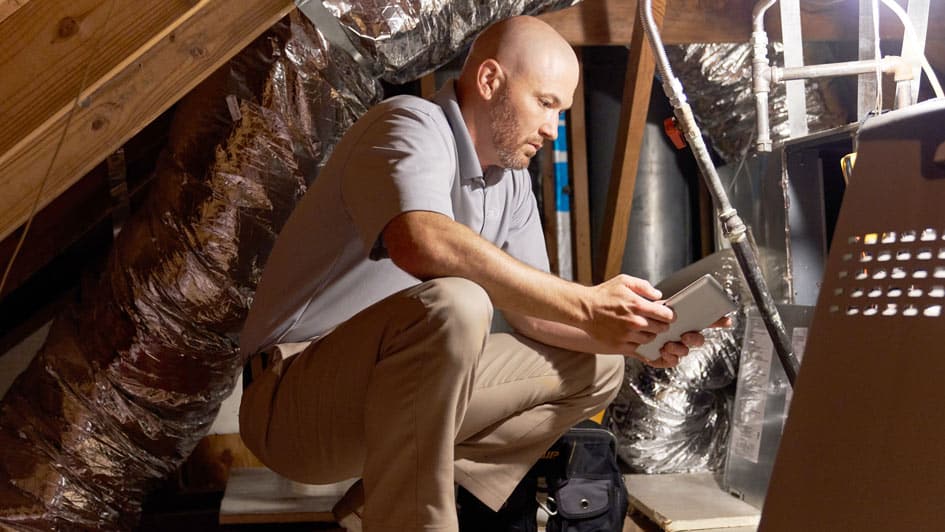Where you aware that more than one-half of your home’s energy costs are for your heating and cooling? This is why it’s critical to secure an energy-efficient HVAC system.
Furnace efficiency standards were last revised to an Annual Fuel Utilization Efficiency (AFUE) rating of 80% in 2015. This rating system measures how effective your furnace is at converting natural gas into heat. An AFUE rating of 80% means your furnace wastes about 20% of the fuel it uses while generating heat.
In 2022, the U.S. government proposed new energy-efficiency standards for residential gas furnaces that would substantially lower emissions, save homeowners money and promote sustainability.
This proposal is anticipated to:
- Save Americans $1.9 billion annually.
- Lower carbon emissions by 373 million metric tons and methane emissions by 5.1 million tons over three decades, the equivalent of what 61 million homes emit yearly.
Starting in 2029, the updated rule would demand all new gas furnaces to feature AFUE ratings of 95%. This means furnaces would combust nearly 100% of the gas into usable heat.
With these facts in mind, you may be asking yourself “what happens to my existing furnace”? As of now, not much, as the proposed rule wouldn’t go into effect until 2029 at the earliest and does not affect furnaces that are already in use.
But if you are considering furnace replacement in soon, highly energy-efficient furnaces are already available. Find out how these furnaces can save you money on your utility bills.
Guide to Condensing Furnaces
How Condensing Furnaces Work
A condensing furnace is a kind of heating system that uses a secondary heat exchanger to capture wasted heat from the furnace’s exhaust gases. This decreases the extent of energy wasted, increases energy efficiency and lowers CO2 emissions. It also will take less natural gas to produce the same volume of heat when comparing one to other types of furnaces.
How Condensing Furnaces Differ from Non-Condensing Furnaces
The primary difference between a condensing furnace and a non-condensing furnace is condensing models use a secondary heat exchanger to collect any wasted heat from its exhaust gases, while the other does not.
How Long Condensing Furnaces Last
The life span of a condensing furnace is dependent on the brand, model and other factors. In most cases, a condensing furnace should last between 10-20 years with proper maintenance and regular service. If you put off scheduled maintenance, the equipment may not last as long.
Why Condensing Furnaces Cost More
Usually, condensing furnaces enhanced precision is a lot more efficient than standard, single-speed furnaces, as it only uses the minimum amount of energy necessary to heat your home, saving you money in the long run.
The majority of variable-speed furnaces are condensing furnaces, although a few are available in non-condensing models with lower AFUE ratings. If a manufacturer wants a furnace to be classified as a condensing furnace, it must offer an AFUE rating of 90% or higher.
Do Variable-Speed Furnaces Run All the Time?
A variable-speed furnace doesn’t operate all the time. Rather, it runs at different speeds according to the temperature in your Beckley home as well as the amount of energy it needs to sustain that temperature.
When sufficient energy is required to maintain your desired temperature level, the furnace will switch to a higher speed to handle the demand. Precise fan speeds offer more efficient heating in your home while also providing quieter operation.
Guide to Two-Stage Furnaces
Two-Stage Furnaces: What They Are and How They Work
As the name suggests, a furnace with two levels of operating (high or low) is called a two-stage furnace. In the low stage, the furnace runs at a reduced capacity as a way to maintain the desired temperature for your home more efficiently. During the high stage, the furnace will instead operate at full capacity to meet demands for increased heat. With a two-stage furnace, you can maintain improved energy efficiency and comfortable temperatures everywhere in your home.
While two-stage furnaces are exceptionally efficient, not all all models are condensing furnaces.
Does a Two-Stage Furnace Function All the Time?
A two-stage furnace won’t run all the time. In the low stage of operation, the furnace performs at limited capacity in order to sustain a planned temperature more efficiently within your home. When a greater demand for energy is needed to sustain the set temperature, the heating system shifts to its high stage and operates at full capacity. As such, two-stage furnaces are powerful enough to help reduce energy costs without operating continuously.
Comparing Two-Stage and Variable-Speed Furnaces
Two-stage furnaces have two stages of operation, low and high. During the low stage, the furnace works at reduced capacity in order to uphold a desired temperature within your home. When a greater demand for warmth or cooling is necessary, the furnace will shift to its high stage and operate at peak capacity.
Variable-speed furnaces, meanwhile, can function at several speeds in order to sustain a more precise temperature at home. As such, variable-speed furnaces offer greater savings on your utility bills .
Differences Between One- and Two-Stage Furnaces
One-stage furnaces have a single stage motor and operate either at full capacity or not at all. In other words, the furnace runs constantly in order to maintain a desired temperature at home.
Two-stage furnaces, on the other hand, have two stages of operation, low and high. While in the low stage, the furnace runs at lower capacity in order to maintain the desired temperature more efficiently. When additional warmth or cooling is needed, the furnace will change over to its high stage and operate at full capacity.
Arrange Your Furnace Install Appointment with Appalachian Heating Today
Modern furnace technology can be confusing. That’s why Appalachian Heating experts are here to help with a free, no-pressure estimate for furnace installation. We’ll assess your home, your heating needs and your budget before helping you find the ideal solution. Get in touch with us at 304-877-5566 to get started today!




